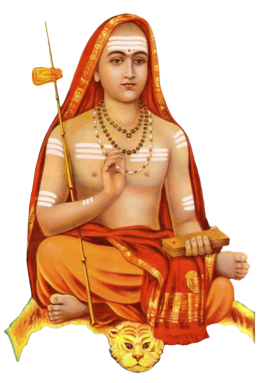त्वगाह्वयैर्धातुभिरेभिरन्वितम् ।
पादोरुवक्षोभुजपृष्ठमस्तकैः
अङ्गैरुपाङ्गैरुपयुक्तमेतत् ॥ ७२ ॥
tvagāhvayairdhātubhirebhiranvitam |
pādoruvakṣobhujapṛṣṭhamastakaiḥ
aṅgairupāṅgairupayuktametat || 72 ||
मोहास्पदं स्थूलमितीर्यते बुधैः ।
नभोनभस्वद्दहनाम्बुभूमयः
सूक्ष्माणि भूतानि भवन्ति तानि ॥ ७३ ॥
mohāspadaṃ sthūlamitīryate budhaiḥ |
nabhonabhasvaddahanāmbubhūmayaḥ
sūkṣmāṇi bhūtāni bhavanti tāni || 73 ||
स्थूलानि च स्थूलशरीरहेतवः ।
मात्रास्तदीया विषया भवन्ति
शब्दादयः पञ्च सुखाय भोक्तुः ॥ ७४ ॥
sthūlāni ca sthūlaśarīrahetavaḥ |
mātrāstadīyā viṣayā bhavanti
śabdādayaḥ pañca sukhāya bhoktuḥ || 74 ||
Subtle essences—Tanmâtrás.
Form sense-objects—by being received by the sense-organs.
Sound and the rest—sound, touch, smell, taste and sight.
Happiness .—Happiness includes its opposite,—misery also.
रागोरुपाशेन सुदुर्दमेन ।
आयान्ति निर्यान्त्यध ऊर्ध्वमुच्चैः
स्वकर्मदूतेन जवेन नीताः ॥ ७५ ॥
rāgorupāśena sudurdamena |
āyānti niryāntyadha ūrdhvamuccaiḥ
svakarmadūtena javena nītāḥ || 75 ||
Powerful emissary .—Just as culprit seizing things not belonging to him is put in fetters and sentenced by the royal affair in various ways, so the Jiva, oblivious of his real nature, through his attachment to sense-object is subjected to various kinds of misery.
Vivekachudamani – Introduction
1: Devoted Dedication
2: Glory of Spiritual Life
3: Unique Graces in Life
4-7: Miseries of The Unspiritual Man
8-13: Means of Wisdom
14-17: The Fit Student
18-30: The Four Qualifications
31: Bhakti – Firm and Deep
32-40: Courtesy of Approach and Questioning
41-47: Loving Advice of the Guru
48-49: Questions of the Disciple
50: Intelligent Disciple – Appreciated
51-55: Glory of Self-Effort
56-61: Knowledge of the Self-Its Beauty
62-66: Direct Experience – Liberation
67-71: Discussion on Questions Raised
72-75: Gross Body
76-82: Sense Objects a Trap – Man Bound
83-86: Fascination for Body Criticised
87-91: Gross Body Condemned
92: Organs of Perception and Action
93-94: Inner Instruments
95: The Five Pranas
96-101: Subtle Body – Effects
102: Functions of Prāna
103-105: Ego Discussed
106-107: Infinite Love – the Self
108-110: Māyā – Pointed Out
111-112: Rajoguņa – Nature and Effects
113-116: Tamoguņa – Nature and Effects
117-119: Sattvaguņa – Nature and Effects
120-121: The Causal Body – Its Nature
122-123: Not-Self – Description
124-135: The Self – Its Nature
136: Advice for Self-control
137-142: What is Bondage – The Reply
143-144: The Powers – Agitation and Veiling
145-146: Bondage in Action
147-153: Ātman and Anātman – Discrimination
Negation of the Kośas
154-164: – Annamaya kośa (Food sheath)
165-166: – Prņamaya kośa (Vital air sheath)
167-183: – Manomaya kosa (Mental sheath)
184-188: – Vijnanamaya kośa (Intellectual sheath)
189-191: Ātman – Unattached
192-193: What is Liberation? – Disciple
194-206: Self-Knowledge gives Liberation
207-210: Anandamaya kośa (Bliss sheath)
211: Ātman – Other than the Five Kośas
212: What is Ātman? – Disciple
213-225: Nature of the Self – Discussion
226-236: All Manifestation Absolute
237-240: Brahman – Its Nature
241-249: That Thou Art – Explanation
250-253: Attitude in Meditation
254-266: Aids to Meditation
267-276: Give up Vāsanās – the Method
277-292: End Superimposition – The Means
293-297: The Perceived I’ Factor – False
298-309: Condemnation of the Ego
310-319: Actions, Thoughts and Vāsanās – Renounce
320-329: Total Vigilance – Its Price
330-338: In the One, No Plurality
339-348: Spiritual Growth – the Secret
349-353: Cause-Effect – False
354-372: Samadhi – Its Nature
373-378: Fully Detached – Samadhi Easy
379-383: Meditation – the Technique
384-397: Continuous Attention to Self
398-406: No Diversity in Reality
407-413: Ātma-vicāra – Contemplation
414-418: Give up Perceptions
419-425: The Science of Reality – Its Benefits
426-445: Signs of a Realised Seer
446-464: Prārabdha for a Saint
465-471: There is No Plurality
472-479: Experience of Selfhood
480-520: Practice of Knowledge – Disciple
521-575: Final Words of Advice
576-578: Blessed Disciple Liberated
579-581: The Glory of the Textbook

Vivekachudamani – Verses 72-75 – Vivekachudamani Verses 72-75 – By Adi Sankaracharya – In Sanskrit with English Meaning, Transliteration, Translation, Commenary, Lyrics, Audio – Vivekachudamani-72-75
